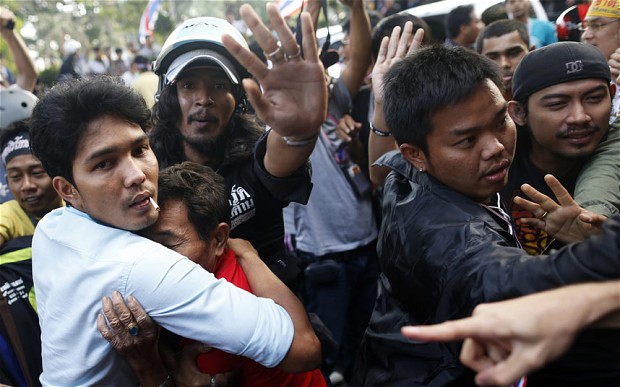Thailand’s embattled prime minister was forced to flee crowds of anti-government protestors on Sunday as clashes sparked by an opposition-backed “people’s coup” left four dead.

Police and troops fought running street battles with estimated 30,000 protesters, some of whom surrounded a police compound where the prime minister, Yingluck Shinawatra, was about to give media interviews denouncing the violence.
As she made an emergency evacuation with her bodyguard, the protesters stormed a state television station and other government ministries, and also attempted to break into her office at Government House.
Police defended the building with volleys of tear gas and water cannon, while demonstrators – many of them masked – responded with stones, bottles and petrol bombs. At the state television station, dozens of black-shirted protesters streamed into the building, demanding that it share broadcast line with a network controlled by the opposition Democrat Party.
Sunday’s disturbances followed a week of protests, which were sparked by an attempt by Ms Yingluck’s ruling Pheu Thai party to pass an amnesty law that would have allowed the return from exile of her brother, Thaksin Shinawatra. He was deposed as prime minister himself by a military coup in 2006.
The violence, which prompted the government to urge residents of the capital stay indoors overnight, comes ahead of Thailand’s busy Christmas and New Year tourist season. The Foreign Office has warned British tourists, nearly a million of whom visit Thailand every year, to take extra care and avoid any political gatherings.
The protestors regard Ms Yingluck as a proxy for Mr Shinawatra, who fled into exile in 2008 to avoid corruption charges that he claims were politically-motivated. Many Thais believe that he continues to control the Pheu Thai party from his homes in Dubai and London, where he owns a mansion in Kensington.
This is the final day for us, win or lose,” said Suwat Lertchanavong, a 30-year-old jewellery salesman involved in the protests. “I don’t know what will happen tomorrow, but today is about protecting democracy by getting rid of Yingluck.”
The political divide underscores social divisions between Mr Thaksin’s supporters, who are mainly from rural areas, and their opponents, who are mostly metropolitan and middle class. The latter group despise Mr Thaksin for his perceived disloyalty to the revered monarch, King Bhumibol, and for the corruption that they say has flourished under the Pheu Thai party.
However, Ms Yingluck’s populist policies have ensured the Pheu Thai party a commanding majority in parliament, making her likely to win any forthcoming election.
That has led Suthep Thaugsuban, a former senior politician in the opposition Democrat Party, to call for the government to be replaced with an unelected “people’s council”. He also urged a general strike to take place on Monday.
Such calls for large-scale political mobilisations have been common feature of Thai politics in recent years. In 2010, pro-Thaksin protesters occupied downtown Bangkok for weeks in a standoff that ended with parts of the city in flames and more than 90 dead.
Pheu Thai can rely on the Red Shirts, the hardcore Thaksin loyalists from rural or working-class urban areas, to turn out in support of the government, while a loose alliance of anti-Thaksin groups, sometimes known as yellow shirts, do the same for the opposition Democrat Party. Their food, water and transport are all paid for by the respective political parties.
However, Mr Suthep’s latest call for the overthrow of the state seems unlikely to gain momentum. Demonstrator numbers are significantly down from the 100,000 who staged a mass rally in Bangkok last weekend. Nor is there any sign that the military is willing to step in on the side of the protestors, with the army chief calling on Mr Suthep to hold talks with Ms Yingluck.
I am disappointed that we did not succeed today, said Siriluck Luanghvisut, a 45-year-old businesswoman from Bangkok. “But I still hope we can get rid of this government.





